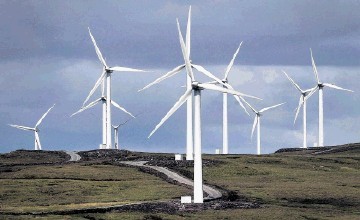
Local communities will have the final say in bids to build large scale onshore wind farms under plans set out in the Queen’s Speech.
The Government is introducing an Energy Bill which will change the law to remove the need for the Energy Secretary to approve large wind farms of more than 50 megawatts (MW), schemes which would typically involve dozens of wind turbines.
The move, along with changes to planning policy, will mean that local authorities will have final say on such projects in England and Wales.
The Tories have also committed to end new subsidies for onshore wind to deliver on a pledge to stop the spread of wind farms in the countryside, claiming the technology often fails to win public support, but measures to deliver on the promise are not included in the Bill and will be set out separately.
Industry body RenewableUK calculates that subsidies for onshore wind, one of the cheapest forms of low-carbon energy, added just £10 to the average consumer bill last year.
The Energy Bill also includes measures aimed at increasing energy security and boosting domestic oil and gas production, including giving the Oil and Gas Authority the powers to become a robust, independent regulator and enable it to maximise the economic recovery of oil and gas from UK waters.
Maria McCaffery, chief executive of RenewableUK, said: “Singling out one of the most popular and lowest cost forms of energy technology for different treatment in the planning system sends a worrying message to investors across the energy sector.
“Onshore wind is committed to being a good neighbour to the local communities in which it is hosted, providing substantial economic advantages to the region including the ground-breaking community benefits it pays, so we are confident that local authorities should recognise the value of these projects.
“However, we do hold concerns for the potential for delay of these significant infrastructure projects, so it is very important that local authorities are given full support and resourcing to enable them to make swift decisions.”
Across the UK, 7,134 MW of onshore wind projects with 2,836 turbines are awaiting consent. Some 45 sites of 50MW or above are awaiting the go-ahead, but most of them, 37 schemes, are in Scotland which is not affected by the changes.
There are seven large scale projects in Wales and none in England currently in the planning system, while one scheme is awaiting consent in Northern Ireland, where the changes would also not affect the planning regime.
Onshore wind farms totalling 4,945 turbines across the UK are already in operation, a further 619 turbines are being put up, and projects with 2,895 turbines have consent – although not all of them will necessarily go ahead, according to RenewableUK.
Onshore wind farms cost the consumer £10.50 on the average annual bill, or around 20p a week, under the existing subsidies regime, while offshore wind added £13.50 to household energy costs last year, and small-scale domestic wind turbines added less than £1.
The most recent survey from the Department of Energy and Climate Change found that while onshore wind commanded lower public support than offshore wind, wave and tidal energy and solar power, it was still backed by around two thirds of people (65%).
Friends of the Earth campaigner Alasdair Cameron said: “Local people should have a greater say over renewable energy projects, which are popular, but it is ironic that this is happening as the Government is doing everything it can to overcome opposition to fracking, which most people oppose. It’s pretty clear this is nothing to do with what the public actually wants.
“Wind farms are not for everywhere, but they are a popular and affordable form of energy, providing jobs and investment in rural communities.
“A big risk is that local authorities may not be equipped to deal with the scale and complexities of large wind farm applications, or that they will be hamstrung by new planning restrictions.”
Ian Marchant, chairman of Infinis Energy, speaking on behalf of the British Wind partnership, said: “The proposed approach contradicts the Government’s manifesto commitment to ‘meet our climate change commitments, cutting carbon emissions as cheaply as possible, to save you money’ as the cost of substituting more expensive alternative technologies in place of onshore wind would needlessly add several hundred million pounds every year to energy bills.
“It surely cannot be the Government’s intention to deny local communities the chance to host onshore wind projects if that is what they want to do.
“Energy policy needs to honestly reflect the views of voters: the Government’s own polls show onshore wind is backed by 65% of the public, more than supported any political party at the election.”
